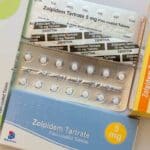Lunesta (eszopiclone) is a brand-name non-benzodiazepine sedative-hypnotic, a class of medications also known as Z-drugs. Similar medications include zaleplon (brand name Sonata), zolpidem (brand name Ambien), and zopiclone.
Lunesta is prescribed as a sleep aid to treat sleep problems for a limited period of time or on an as-needed basis and is available in 1 mg, 2 mg, and 3 mg tablets for oral use. The maximum recommended dose of Lunesta for treating sleep disorders in healthy adults is 2-3 mg per day.
The recommended starting dose, number of doses taken each day, and time between doses vary for patients according to the medical condition being treated and other factors like age, liver disease, physical size, and history of substance use.
Typical Lunesta Dosages
You should only ever take Lunesta as directed by your healthcare provider, and you should always review the medication guide included with your prescription before use. Ask your doctor if you have any questions about your prescription or how to use Lunesta safely.
For the purpose of providing generalized drug information, starting doses of Lunesta (oral dosage form/tablets) for the treatment of insomnia are often as follows:
- adults: Lunesta 1 milligram (mg) at bedtime
- older adults: Lunesta 1 mg at bedtime
- children: use and dose determined by the prescribing medical professional
Lunesta Max Dose
To minimize the risk of adverse effects, healthcare providers generally prescribe the lowest dose that is effective for the patient and only increase this dose if required.
Generalized maximum recommended dosages of Lunesta for the treatment of insomnia are as follows:
- adults: Lunesta 3 mg dose per day
- older adults: Lunesta 2 mg dose per day
- children: maximum dose determined by the prescribing medical professional
If you accidentally took 6 mg of Lunesta, or higher doses still, you may experience next-morning sedation and other enhanced or unwanted effects of Lunesta.
Lunesta Overdose Risk
Lunesta overdose effects are generally not dangerous unless the medication was taken with other drugs, especially other CNS depressants like opioid narcotics or alcohol.
Seek medical advice if an overdose occurs and summon emergency medical care if you or someone around you begins to have breathing problems.
Proper Use Of Lunesta
Lunesta works quickly to help you fall asleep. It should be taken just before you go to bed or when you have trouble falling asleep. It should not be taken at any time when you will not have the opportunity to get a full night’s sleep of up to eight solid hours of rest.
Lunesta can become habit forming. Do not take more of this medication, more often, or for a longer period than directed by your doctor, as this can lead to mental or physical dependence and eventual withdrawal symptoms.
Also, do not crush, break, or chew your tablets as this can intensify and shorten the drug’s effects.
Lunesta is considered safe for occasional use while breastfeeding, but consult your doctor first. In addition, it is important to take Lunesta on an empty stomach, not with other food or after a recent high-fat meal.
If you miss a scheduled dose of Lunesta, ignore it and take your next dose as scheduled without doubling up or taking your previous dose when you are not in a position to sleep for a full night.
Storing Lunesta
Lunesta should be stored safely out of the reach of children in a closed container. It should be kept at room temperature away from heat sources, moisture, or direct sunlight. It should not be frozen.
Ask a healthcare professional how you should dispose of any medicine that becomes outdated or that you no longer need. Do not keep excess or expired medication.
Drug Interactions
Before using Lunesta, tell your doctor what prescription drugs, over-the-counter drugs, and supplements you take, especially if they also cause drowsiness and sedation and potentially add to Lunesta’s overall effects.
Lunesta Side-Effects
The most common side effects associated with use of Lunesta are:
- dry mouth
- an unpleasant taste
- drowsiness
- headache
- dizziness
- feelings of illness
Lunesta may also cause certain serious side effects and adverse effects, especially when it is taken with other drugs or alcohol.
These can include:
- allergic reactions
- anxiety
- feeling hungover
- abnormal thoughts or behavior, including hallucinations and suicidal thoughts
- memory problems
- memory loss
- sleepwalking, sleep-driving, and other complex sleep activities
- trouble breathing (respiratory depression)
- next-day impairment of movement and reactions that can make it unsafe to drive or use
- machinery (psychomotor impairment)
Treatment For Lunesta Abuse
Lunesta can be habit forming and addictive, especially if abused. To learn about our addiction treatment options, please contact Northeast Addictions Treatment Center today.
Written by
Northeast Addition Editorial Team
©2024 Northeast Addition Center | All Rights Reserved
This page does not provide medical advice.




